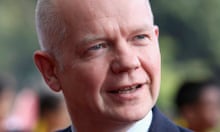David Cameron has conceded that there was insufficient social mobility in British society and said it was the job of the government to raise the aspirations of people from poor backgrounds to get top jobs in public life.
Speaking days after Sir John Major criticised the "truly shocking" dominance of the affluent and privately educated in public life, the Eton- and Oxford-educated prime minister accepted that the coalition must "do far more" to increase diversity in the national elite.
On the first evening of a trip to India, Cameron told reporters travelling with him that he absolutely agreed with the thrust of Major's comments and criticised the social make-up of politics, the media, armed forces and judiciary. His remarks came on the same day his social mobility adviser, Alan Milburn, warned of Britain's "flatlining" social mobility.
Major's remarks had been interpreted as a dig at the number of privately educated people in Cameron's Downing Street team and lack of diversity in the coalition cabinet. Cameron and two other Old Etonians – Sir George Young and Oliver Letwin – attend cabinet, while there are a number on his No 10 staff, including Jo Johnson, the brother of the London mayor, and Ed Llewellyn, Cameron's chief of staff.
However, opting to embrace his Tory predecessor's criticisms, Cameron insisted he welcomed the "very important" intervention from Major, who grew up in Brixton, attended a state school and did not go to university.
"You only have to look at the make-up of the high levels of parliament, the judiciary, the army, the media. It's not as diverse; there's not as much social mobility as there needs to be," Cameron said, adding it was something he had "tried to change". "I agree with [Major] that we need a far more socially mobile country. That is something we need to do far more about … We are making some progress but it's not fast enough and we need to go further and faster.
"What I want to see is a more socially mobile Britain. I want to see a Britain where no matter where you come from, what god you worship, the colour of your skin, what community you belong to, you can get to the top in television, the judiciary, armed services, politics, newspapers. A lot of these areas are important." Cameron cited coalition policies such as providing extra money for schools with children from poor families, free childcare for toddlers, the free school movement and rising numbers of university students from deprived areas as signs of improvement under his rule.
He also argued that the number of Conservative MPs from British Asian and African-Caribbean backgrounds had risen under his leadership, pointing out that he had just appointed Witham MP Priti Patel as "Indian diaspora champion".
Addressing what more could be done, Cameron said: "I do believe it's not good enough to make changes and sit back, you've got to get out there and try and attract talented people. Don't just open the door and say we're in favour of equality of opportunity, that's not enough. You've got to get out there and find people, win them over, raise aspirations and get them to get all the way to the top."
Major told the Tories' South Norfolk constituency party at the weekend: "Our education system should help children out of the circumstances in which they were born, not lock them into the circumstances in which they were born. We need them to fly as high as their luck, their ability and their sheer hard graft can actually take them. And it isn't going to happen magically."
When asked specifically whether his own team was diverse enough, Cameron said he "employs people on the basis of are they the right people to do the job" from the pool of MPs elected to parliament.
Labour seized on the prime minister's comments about aspiration, suggesting they were evidence he does not understand the pressure facing the young and unemployed.
Kevin Brennan, the shadow schools minister, said: "David Cameron has shown shocking complacency towards the 1 million young people unemployed under him. Now he tells them that they lack aspiration. It is he who is locking out opportunity for the next generation and standing up only for a privileged few."
Milburn warned that a lack of social mobility in the UK was the consequence of decades of entrenched elitism and likely to worsen due to a breakdown in the link between economic growth and the wages of most workers. In a speech, Milburn said Major was right to be shocked but wrong to "argue this is the consequence of the actions of any one government".
Milburn, a former Labour cabinet minister, said "deep-rooted inequality and flatlining mobility have been decades in the making", and accused all the political parties of being on a carousel of short-termism that prevented them from addressing the deep-rooted causes of inequality and social immobility in the UK.
He said: "One-third of MPs, half of senior doctors and over two-thirds of high court judges all hail from the private schools that educate just 7% of our country's children. The data is so stark, the story so consistent, that it has all the hallmarks of social engineering."
Milburn set out five long-term goals:
Spending more on childcare rather than tax credits because "early education packs a double punch. It positively impacts children's development and it enables more parents to work".
Doing more to help the less affluent with parenting, even if this required "taking on the Daily Mail argument about the nanny state".
Raising educational standards and closing attainment gaps, including incentivising the best teachers to teach in the worst schools.
Opening up universities and prioritising vocational education. He said: "Four private schools and one college send more students to Oxbridge every year than 2,000 state secondaries. It is obvious that schools and universities need to do far more to ensure doors are open to a wider pool of talent."
Ending the domination of the professions by a social elite by ending unpaid internships and tackling closed shops.
"A recovery that sees national wealth rise might be an economic success but if earnings fall it will be a social failure," Milburn said.











Comments (…)
Sign in or create your Guardian account to join the discussion